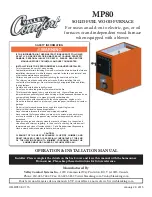
58SP0A/58SP1A: Installation, Start–Up, Operating and Service and Maintenance Instructions
Manufacturer reserves the right to change, at any time, specifications and designs without notice and without obligations.
19
NOTES FOR THERMOSTAT WIRING DIAGRAMS
1. Heat pump
MUST
have a high pressure switch for HYBRID HEAT
®
dual fuel applications.
2. Refer to outdoor equipment Installation Instructions for additional information and setup procedure.
3. If the heat pump date code is 1501E or earlier, select the “ZONE” position on the two speed heat pump control. Heat pumps with date code 1601E
and later do not have or require a “ZONE” selection.
4. Outdoor Air Temperature Sensor must be attached in all HYBRID HEAT
®
dual fuel applications.
5. Configure the thermostat for air conditioner installations. Refer to thermostat instructions.
6. Configure thermostat for heat pump installations. Refer to thermostat instructions.
7. Configure thermostat for single-stage compressor operation. Refer to thermostat instructions.
8. Configure thermostat for HYBRID HEAT
®
dual fuel operation. Refer to thermostat instructions.
9. NO connection should be made to the furnace HUM terminal when using a thermostat with a 24-volt humidifier output.
10. The RVS Sensing terminal “L” should not be connected. This is used internally to sense defrost operation.
11. If thermostat has internal control of heat pump balance point, DO NOT SELECT the “FURNACE INTERFACE” or “BALANCE POINT” option
on the two-speed heat pump control board. Refer to thermostat instructions.
12. Thermostat signals may vary. Consult thermostat installation instructions for more information.
VENTING
The furnace shall be connected to a listed factory built chimney or vent,
or a clay-tile lined masonry or concrete chimney. Venting into an unlined
masonry chimney or concrete chimney is prohibited.
When an existing Category I furnace is removed or replaced, the original
venting system, may no longer be sized to properly vent the attached
appliances. An improperly sized Category I venting system could cause
the formation of condensate in the furnace and vent, leakage of
condensate and combustion products, and spillage of combustion
products into the living space.
Vent system or vent connectors may need to be resized. Vent systems or
vent connectors must be sized to approach minimum size as determined
using appropriate table found in the current edition of NFGC.
GENERAL VENTING REQUIREMENTS
Follow all safety codes for proper vent sizing and installation
requirements, including local building codes, the National Fuel Gas
Code NFPA 54/ANSI Z223.1 (NFGC), Parts 12 and 13 in the United
States, the local building codes, and furnace and vent manufacturers’
instructions.
These furnaces are design-certified as Category I furnaces in accordance
with ANSI Z21.47/CSA 2.3 and operate with a non-positive vent static
pressure to minimize the potential for vent gas leakage. Category I
furnaces operate with a flue loss not less than 17% to minimize the
potential for condensation in the venting system. These furnaces are
approved for common venting and multi-story venting with other fan
assisted or draft hood equipped appliances in accordance with the
NFCG, local building codes, and furnace and vent manufacturers’
instructions.
The following information and warning must be considered in addition
to the requirements defined in the NFGC.
1. If a vent (common or dedicated) becomes blocked, the furnace will
be shut off by the draft safeguard switch located on the vent elbow.
2. Do not vent this Category I furnace into a single wall dedicated or
common vent. The dedicated or common vent is considered to be
the vertical portion of the vent system that terminates outdoors.
3. Vent connectors serving Category I furnaces shall not be connected
into any portion of a mechanical draft system operating under
positive pressure.
4. Do not vent this appliance with any solid fuel burning appliance.
5. Category I furnaces must be vented vertically or nearly vertically
unless equipped with a listed mechanical venter. See SIDEWALL
VENTING section.
6. Do not vent this appliance into an unlined masonry chimney. (Refer
).
WARNING
!
CARBON MONOXIDE POISONING HAZARD
Failure to follow this warning could result in personal injury or death.
Do not bypass the draft safeguard switch, as an unsafe condition could
exist which must be corrected.
WARNING
!
CARBON MONOXIDE POISONING HAZARD
Failure to follow the steps outlined below for each appliance connected
to the venting system being placed into operation could result in carbon
monoxide poisoning or death.
The following steps shall be followed for each appliance connected to
the venting system being placed into operation, while all other
appliances connected to the venting system are not in operation:
1. Seal any unused openings in venting system.
2. Inspect the venting system for proper size and horizontal pitch, as
required in the National Fuel Gas Code, NFPA 54/ANSI Z223.1
and these instructions. Determine that there is no blockage or
restriction, leakage, corrosion and other deficiencies, which could
cause an unsafe condition.
3. As far as practical, close all building doors and windows and all
doors between the space in which the appliance(s) connected to
the venting system are located and other spaces of the building.
4. Close fireplace dampers.
5. Turn on clothes dryers and any appliance not connected to the
venting system. Turn on any exhaust fans, such as range hoods and
bathroom exhausts, so they are operating at maximum speed. Do
not operate a summer exhaust fan.
6. Follow the lighting instructions. Place the appliance being
inspected into operation. Adjust the thermostat so appliance is
operating continuously.
7. Test for spillage from draft hood equipped appliances at the draft
hood relief opening after 5 minutes of main burner operation. Use
the flame of a match or candle.
8. If improper venting is observed during any of the above tests, the
venting system must be corrected in accordance with the National
Fuel Gas Code, NFPA 54/ANSI Z223.1.
9. After it has been determined that each appliance connected to the
venting system properly vents when tested as outlined above,
return doors, windows, exhaust fans, fireplace dampers and any
other gas-fired burning appliance to their previous conditions of
use.
















































